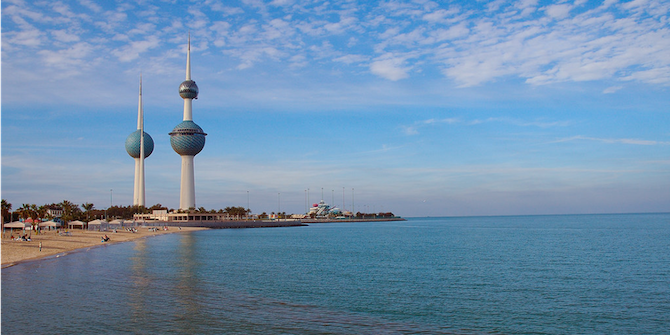by Ganga Shreedhar, Davide Contu, Patricia Freitag, Aseel Takshe & Susana Mourato

Over the past two decades, researchers and policymakers have become increasingly interested in considering the interactions between energy, water, and natural resource systems and sectors when designing climate change policy. This approach is known as ‘nexus thinking’. Its goal is to promote policy coherence by identifying optimal policy mixes that consider the impacts of policies across all sectors. This can help policymakers avoid unintended cross-sectoral trade-offs and synergies, leading to more cost-effective and resource-efficient governance arrangements.
Nexus thinking is particularly important in countries like Kuwait, Saudi Arabia, and Qatar, which are part of the Gulf Cooperation Council and have high per capita emissions and water use. These countries are facing significant climate change risks, including extreme heat and weather events like dust storms. In Kuwait, in particular, domestic agricultural production relies heavily on energy, desalinated seawater and brackish groundwater for irrigation, as well as recycled domestic wastewater. Kuwait has particularly high water-related energy use, mostly for desalination, whilst almost completely relying on fossil fuels.
There is much potential to mitigate climate change through nexus thinking. For example, policies that encourage a transition from fossil fuels to solar energy can help reduce emissions, while recycling wastewater can reduce emissions from desalination. Planting crops can also help sequester carbon. However, it is unclear which of these policies are acceptable to the Kuwait public, and which are not.
To design effective climate change policies, it is important to consider not only technical trade-offs and synergies, but also public perceptions and willingness to adopt nexus policies. In our study we aimed to investigate public support for water-energy-nature (WEN) nexus policies in Kuwait, to assess public support for climate action in the context of the significant risks the country faces.
With the aim to increase public support for WEN policies, our study investigated the impact of moral incentives, specifically eco-Islamic values, in an informational intervention on public support. A randomised controlled trial embedded in a discrete choice experiment survey was conducted with a broadly nationally representative sample of over 400 residents of Kuwait. Participants were randomly allocated to either an informational control condition or a moral incentives treatment condition that appealed to eco-Islamic values. In the survey, participants expressed their preferences for three WEN nexus policy attributes: reduced emissions from transitioning to renewable energy, increased recycled water to reduce wastewater, and planting more trees for nature conservation.
The study found that there was no willingness to pay (WTP) for all nexus policies considered. However, exposure to Eco-Islamic values affected overall support for WEN policies: respondents exposed to the treatment appeared less likely to choose the status quo. We found that informational interventions attempting to ‘green’ religions by making eco-values salient, can also help increase stated support for WEN policies aimed at ‘greening’ systems. At the same time, as there was no significant WTP for WEN policies overall, public communications making salient eco-Islamic values, therefore, cannot in isolation overcome resistance. There are many ways to build on this work. Future research can examine whether results generalise to other countries in the Middle East, and other religions. In addition, we embedded the informational intervention in a survey. Future work can estimate how such interventions can play out in field settings and actual campaigns.
This blog post is part of the Kuwait Programme research project ‘Public Preferences towards Policies to Address the Water–Energy–Nature Nexus in Kuwait‘. Susana Mourato and Ganga Shreedhar are the principal investigator on this project with Davide Contu, Aseel Takshe, and Patricia Freitag.
[To read more on this and everything Middle East, the LSE Middle East Centre Library is now open for browsing and borrowing for LSE students and staff. For more information, please visit the MEC Library page.]






